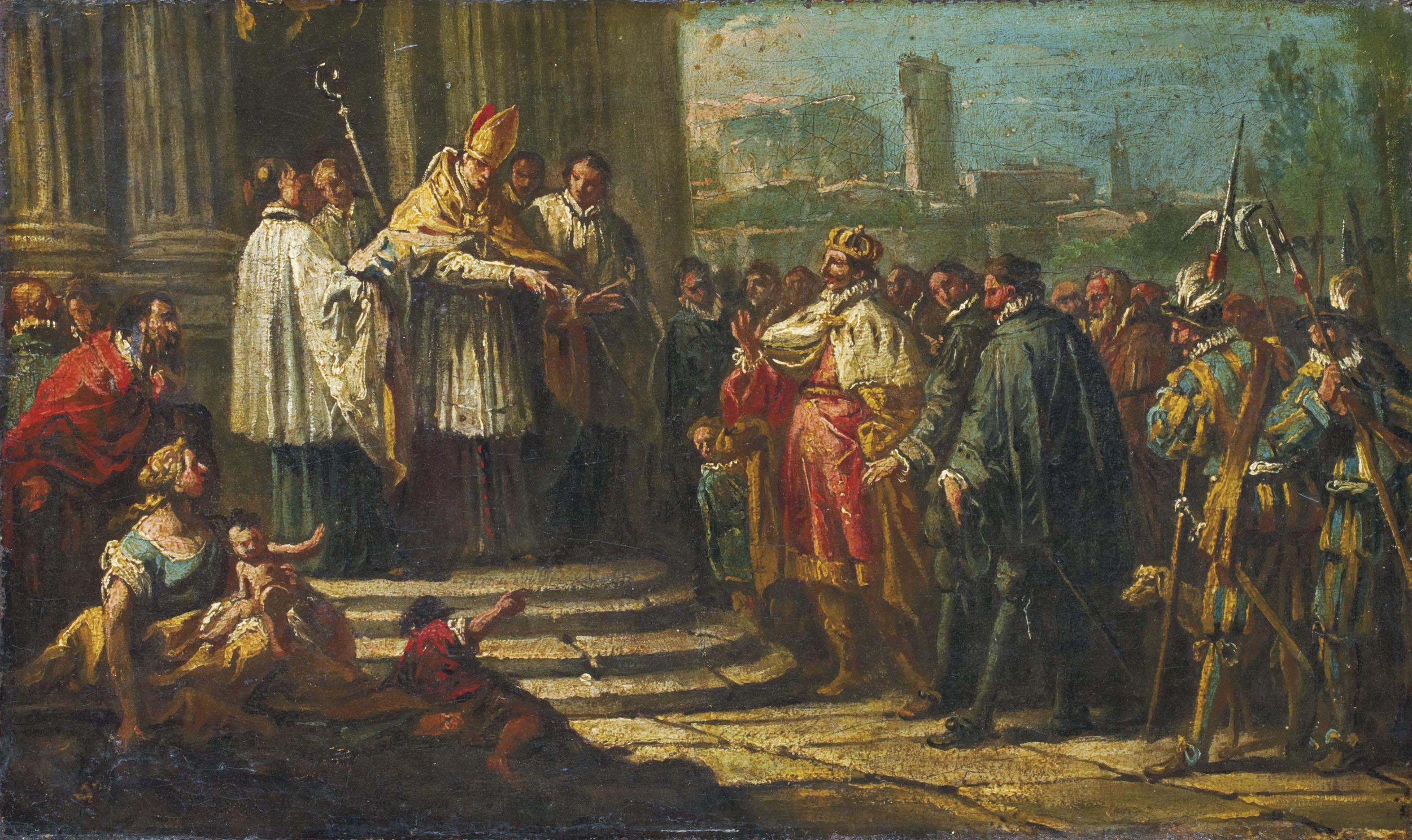
Public Sinners
How to behave with public sinners?
How can and should we deal with public sinners? Due to the general context of the society in which we live today, this problem is often acute for us. Let us recall the great Catholic principles which must inform practice, in order to try to see more clearly to resolve the painful cases which unfortunately arise in our families.
Let us begin by explaining what a public sinner is: he is a person who lives in grievous sin, whose sin is truly scandalous, and is notorious in fact or in law. « Who lives in sin » means that the sins in question are not only passing acts, but that they create a habitual situation.
Public sinners are first and foremost those who have defected from the Catholic faith, who have left the Church to go to non-Catholic groups or sects, or who live in godlessness; then they are those who have a state of seriously sinful life or activity. According to the times, there are those who devote themselves to magic, usurers, women of bad life, etc.
The most common case of public sin is that of people living together without being married. Indeed their guilty relationship is a public fact, that everyone can see. Whether or not they are united by a « civil marriage » does not change their situation in the sight of God. They do not need to cohabit; it is enough that they meet often, and that it is common knowledge that they live in mortal sin.
Because of their public nature, these acts are particularly serious. They represent what is called a scandal, that is to say a reprehensible act which, because of the bad example given to others, can be the occasion of a fall for the neighbour who witnesses it, in inciting him to sin.
The scandal can come from men who live badly, but even more from false principles promoted by the world, in particular the idea that everyone is free to live as he sees fit, and everything must be done to thwart this kind of opinion.
Scandal is precisely (or formally as we say in theology) a sin against charity. We should be reminded of those who reproach us for « lacking charity » towards scandalous people, and who thus invert reality: it is they who offend charity by their unfortunate example.
The Conduct of the Church
To know how to behave towards public sinners, so that our behaviour rests on a solid and non-subjective foundation, we will look at the way the Church acts: it will inspire our own attitude towards them. Indeed the Church has the duty to point out to men the sins which are serious, and to remove them from them; that is why it provides in its law for measures against scandalous sinners.
Thus Holy Communion must be refused, even in public, to anyone whose indignity is certain and public, such as those who have no faith, or those who are known to the public to live together. This is the rule laid down by the Roman Ritual, which has been taken up by canon law: « Those who are publicly unworthy must be removed from the Eucharist, (…) until there are clear signs of their being repent and their amendment, and as long as they have not repaired their public scandal. » Absolution and Holy Communion cannot be given to public sinners as long as they remain in this state. To be admitted to receive the sacraments, these people must have corrected themselves, and have repaired the scandal they caused.
For a concubinary, for example, to cease to be a public sinner, he must remove the occasion of sin. If this is someone who has spread a harmful teaching, he should disown it, and the retraction should be made public.
The Church explains in what spirit and in what manner the priest must act: « If a sacrament is to be refused (to a public sinner), it must always be done with extreme caution and kindness, so that everyone clearly understands that the priest did not want to offend anyone, but that he had in view only the honour of religion and the salvation of souls ». In fact, the priest who would give Communion would make himself an accomplice in the profanation of the sacrament, and would himself cause a serious scandal.
The Church turns away the faithful as much as possible from marriage with public sinners or with non-Catholics, as with those who have abandoned the faith; this because of the danger of perversion for the Catholic spouse and for the children. « This danger is usually all too real; so, learned by experience, the Church finds it very difficult to allow such covenants, and only reluctantly dispenses with this impediment. Divine law forbids it, moreover, to declare these unions lawful as long as the danger of religious perversion of those concerned is not sufficiently removed. »
Canon law still continues: « Those who have committed the public offense of adultery, or who publicly live in cohabitation, must be excluded from legitimate ecclesiastical acts, until they have given signs of repentance. » What we call legitimate acts mainly consists of being a baptism or confirmation godfather or godmother.
Finally, public sinners do not have the right to ecclesiastical burial. This is what Church law says about it: « Are deprived of ecclesiastical burial, unless they have given signs of penance before their death: notorious apostates of the Christian faith, or members of a heretical or schismatic sect, or of a Freemasonic sect or other societies of the same kind; (…) Other public and manifest sinners. »
Co-operation in Evil
What we have said about the Church's way of doing things will shed light on our behaviour towards public sinners, to know how to behave practically with them. The rules which dictate the course to be followed are those of co-operation in evil, that is, of participating in an evil act done by the neighbour.
Co-operation guilty of sin can take many different forms. There is the effective, or positive, co-operation which exerts a real causation on the act of the neighbour: advising evil, praising it, taking it under its protection in some way, taking its defense, participating in it. And there are negative forms of co-operation: not to warn, not to obstruct it, not to demonstrate, when one should have done it.
There is no way you can approve of a sin, or promote it in any way. Any approval of an evil deed is necessarily culpable, since it is associated with the evil intention of the one who performs it.
Note that in the last forms of co-operation that we have mentioned (do not warn, do not stand in the way), we did not take any action, we did nothing. Yet these are sins of omission. In fact, allowing a bad deed to be done can be guilty. Because it is not enough to please God not to take any positive action, we must still assume our duties against evil. If there is no serious reason to the contrary or too serious an inconvenience, charity asks to try to prevent the fault of the neighbour or not to contribute to it, even materially. The sins of others can be blamed on us too, if we have co-operated with them by doing nothing to prevent them.
The omission of fraternal correction is therefore part of negative co-operation. We are guilty when we are silent, when we should have spoken: « He who does not say a word consents », says the adage. We must do it with tact and delicacy, of course, as we would like us to do with ourselves; but that does not preclude the firmness on the substance. Parents (towards their children) and superiors (towards their inferiors) have a special duty of correction and instruction.
The Common Good
Among the main elements to consider in determining our attitude in this area are the common good and the damage that can be done to it. Indeed, public sins have a social impact. You can easily see the devastating effect of a bad example. Any weakness, any unjust concession to a public sin is an attack on the common good, and is therefore an evil.
If the Church takes the severe measures that we have seen, it is of course for the honour of God, of whom we do not laugh. It is also to protect good souls, and to warn others. It is therefore for the common good of society.
To destroy Christian spirit and morals, the devil now has all the media at his disposal, which spreads corruption on a large scale. In the name of tolerance - which is really indifference - he inspires people to accept all behaviour. And we see immorality permeating everywhere.
Our duty is therefore to protect our families. However, their solidity derives its strength from our steadfastness in defending the law of God and Catholic morality, and really living off them. Let us respect and ensure respect for God's sovereign law on the family, founded on the sacrament of marriage. If we do not defend the dignity and the sanctity of marriage, we are going to ruin families. What prompts us to be firm in the face of evil is not a lack of heart, but on the contrary the charity of the truth, and the love of the common good.
To know whether or not to intervene in the face of an evil, we must therefore ask these questions: What is the impact on the common good? Is there a sufficiently serious reason that justifies my being silent?
Rules of Conduct
If the principles are clear, their application to the various concrete cases is generally delicate. If you do not react, you become used to the evil. But by doing the wrong thing, sometimes you can do more harm than good.
Let us outline some broad lines of the Catholic attitude to inform our practice:
- We cannot regard and treat as spouses people who are not before God. It is therefore not permissible to put an illegitimate couple on an equal footing with a married couple, or to treat them in the same way. This would be to grant a certificate of « normalcy » to an abnormal situation, which gravely offends the law of God and the common good. To do so would be showing worldly spirit, cowardice, and lacking that living faith which should guide the true Christian in his thoughts, words and deeds.
- Christian marriage cannot agree with cohabitation. So the family can never receive a false couple at a family reunion: to receive them in a family context would dissolve the family.
The family can welcome its own member who lives in this state of sin, but alone. The partner is not part of the family, therefore access to the family sanctuary is closed to him. Perhaps the invited family member will refuse to come if his or her partner cannot accompany him, and so neither will come. But the good and the protection of the family are paramount.
- If we see them both exceptionally - and therefore outside the family framework - it must be in the hope of enlightening the consciences, if there is any good will on their part. It can also be to maintain family ties between parents and children, or between brothers and sisters. But it needs to be clear, and that such encounters cannot be interpreted by the false couple, or by others, as endorsement of their situation, even though years have passed. In particular, any risk of ambiguity should be avoided among young people or children who are aware of our inaction.
- Firmness in principles must go hand in hand with charity towards people. We must resemble God himself as much as possible, God who unites hatred of sin and mercy towards the sinner: in his image, we must be intractable towards sin, and love the poor sick. This is the attitude our Saviour exemplified to us with public sinners he may have encountered, such as the Samaritan woman, Mary Magdalene or the adulterous woman: « Go; henceforth do not sin any more. » So we we do not hurt uselessly, we explain our attitude in all charity. But to love the sinner is precisely to try to get him out of his sin. And to love others is to ensure that the evil does not spread further by our inaction.
Take Account of the Context
As with any prudential judgment, the entire context must be taken into account. There are people whose separated parents are both living in adultery, whose siblings are almost all in illegitimate unions, and so are their children. Should they break up with their whole family? We see here that the scandal is also measured by the number of people in this situation.
In other words: if the case is unique in a family that is still relatively preserved, we must be all the more resolute to prevent the disease from spreading.
On the contrary, have those who live in order become the exception? So Saint Paul's remark is of worth: « you would have to cut yourselves off from the world altogether ». Let us quote this passage where Saint Paul explains to us the attitude to have: « No, my letter meant that if anyone who is counted among the brethren is debauched, or a miser, or an idolater, or bitter of speech, or a drunkard, or an extortioner, you must avoid his company; you must not even sit at table with him (...) leaving God to judge those who are without ». (I Cor. 5: 10, 11, 13)
We must therefore be more severe with « the one who bears the name of brother », the one who is Catholic or at least was one, who received a Catholic education, than with one who has only known the once-again pagan world that surrounds us.
Be lights for the world, Our Lord commands us, be the salt of the earth, able to prevent putrefaction from setting in. More than ever, nowadays the world needs convinced Catholics, who live according to the principles of the faith and be examples, with the grace of God. It is at this price that our families can be preserved, and that Our Lord Jesus Christ will continue to be their master.
Father Hervé Gresland, FSSPX - Source: La Porte Latine


